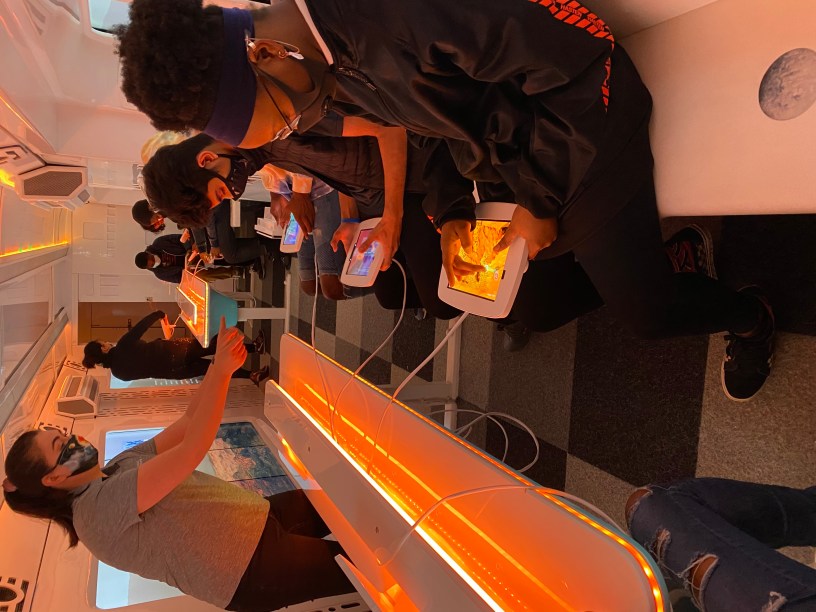Editor’s note: This story led off this week’s Future of Learning newsletter, which is delivered free to subscribers’ inboxes every other Wednesday with trends and top stories about education innovation. Subscribe today!
When science teacher Kathryn Spivey told her students at Benjamin Banneker Middle School in Burtonsville, Maryland that they were going to take off and visit planet Mars for a day on a Magic School Bus of their own, they didn’t know what to expect.
Unlike the one Ms. Frizzle’s science students ride in the animated series, the bus that showed up in their school parking lot this May was black, not yellow. But even though they didn’t actually go all the way to Mars, the experience was still pretty magical, Spivey said.
Inside, a long bench runs along one end of the bus’ gleaming white interior, with tablets stationed in the middle. The bus is also decked out with high-definition video and special effects panels, which take students on a five-minute, 360-degree immersive trip across the entire solar system.
Students learn a little about each of the planets before they land on planet Mars. Along the way, they also learn to solve problems that astronauts could face on a journey into space. What happens if something goes wrong with their spacecraft? What happens if the batteries run out and they need to find another energy source before they freeze? Then, the students are given an individual tablet and get to work on designing a rover and completing activities that help them think like engineers.
“It was more really about problem solving and using the strategies in the tech and science design process,” Spivey, the school’s science and technology content specialist, said. “They’re learning, reminding themselves of the science concepts like what do you need to survive, like oxygen and water, and they talked about chemistry so it actually ties into all of the middle school science program.”

The bus is one of a fleet of six mobile labs that deliver hands-on science lessons to rural and low-income communities. The program is run by Learning Undefeated, a nonprofit organization that brings immersive STEM experiences and resources to students to encourage student interest in STEM careers.
Learning Undefeated offers four different kinds of STEM labs. Its original MdBioLab is a state-of-the-art wet lab, where hazardous chemicals can be handled, housed inside of tractor-trailer that provides disaster recovery STEM education to schools impacted natural disasters. There’s the MXLab, a custom-built advanced mobile lab, also built inside a tractor-trailer, designed for high school students focusing on bioscience and chemistry. The Drop Anywhere labs, built inside small shipping containers, introduce students to various STEM fields. Then there’s the explorer lab bus, which Spivey’s students experienced.
Aboard each of the mobile labs are Learning Undefeated instructors, often along with other scientists and educators and interns from AmeriCorps, said Janeé Pelletier, Learning Undefeated’s vice president of communication and events.
The organization’s programs, she said, are meant to create “positive, fun experiences that increase student confidence and also lead them to seek out additional activities and interactions with STEM subjects.” The hope is that students will see opportunities for themselves in STEM careers someday.
“We’re building and reinforcing a student’s STEM identity,” said Pelletier, “their belief that they can be successful in a STEM job and that they can envision themselves as getting from here to there.”
For the past year, the Learning Undefeated team has been working remotely, creating at-home science experiments from their kitchens; most of their mobile buses have been sitting idle. The organization was just restarting in-person school visits in Maryland and D.C., where they are headquartered, when they heard from Spivey. The school visit to Benjamin Banneker Middle School was one of the first since last March, with the exception of the MXLab, which has been traveling across Texas visiting rural schools as part of a statewide partnership with the Texas Education Agency.
For Spivey’s students, the bus’ hands-on science lessons have been “a bright star” in an otherwise tough year.
The students at Banneker had been learning remotely since March 13, 2020. The students here have been heavily impacted by Covid-19; many having lost one or more family members over the past year. During remote learning, Spivey said she and other teachers at Banneker tried hard to come up with different ways to keep students engaged, from virtual labs and college fairs to a STEM club that meets after school. The school had been back in-person, but only partially, for three and a half weeks when Spivey called Learning Undefeated, hoping to give her students a hands-on science lessons in one of their big units, astronomy.
Spivey’s students had originally thought it was going to be a “bunch of robots talking” but after spending a day on the bus exploring space and learning about engineering, she said students commented on how cool it was.
Not only were the students excited about what they had learned, but “the kids have had a blast.”
“I’m trying really hard to get these kids experiences they may have missed out on,” Spivey said. “It really is something the kids are enjoying and I think they’re learning more than they realize.”
This story about hands-on science lessons was produced by The Hechinger Report, a nonprofit, independent news organization focused on inequality and innovation in education. Sign up for Hechinger’s newsletter



At The Hechinger Report, we publish thoughtful letters from readers that contribute to the ongoing discussion about the education topics we cover. Please read our guidelines for more information. We will not consider letters that do not contain a full name and valid email address. You may submit news tips or ideas here without a full name, but not letters.
By submitting your name, you grant us permission to publish it with your letter. We will never publish your email address. You must fill out all fields to submit a letter.